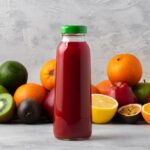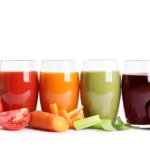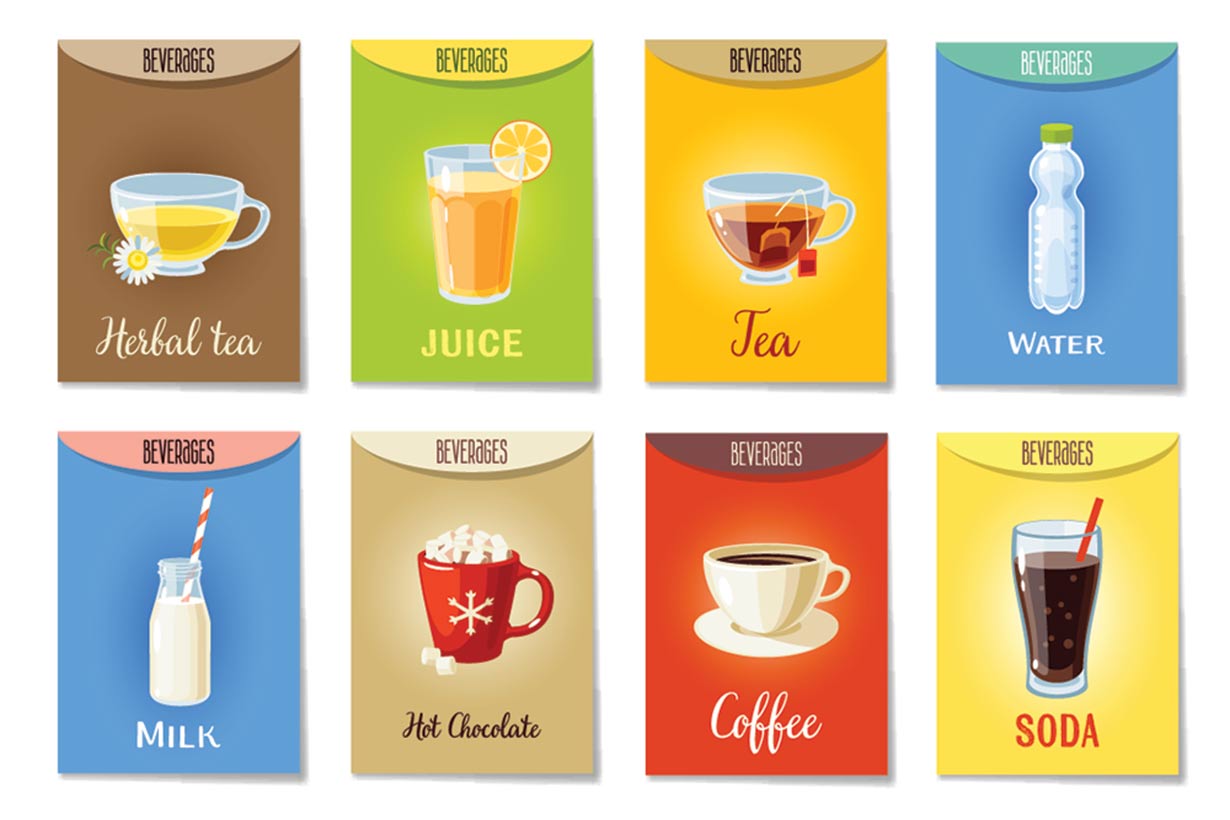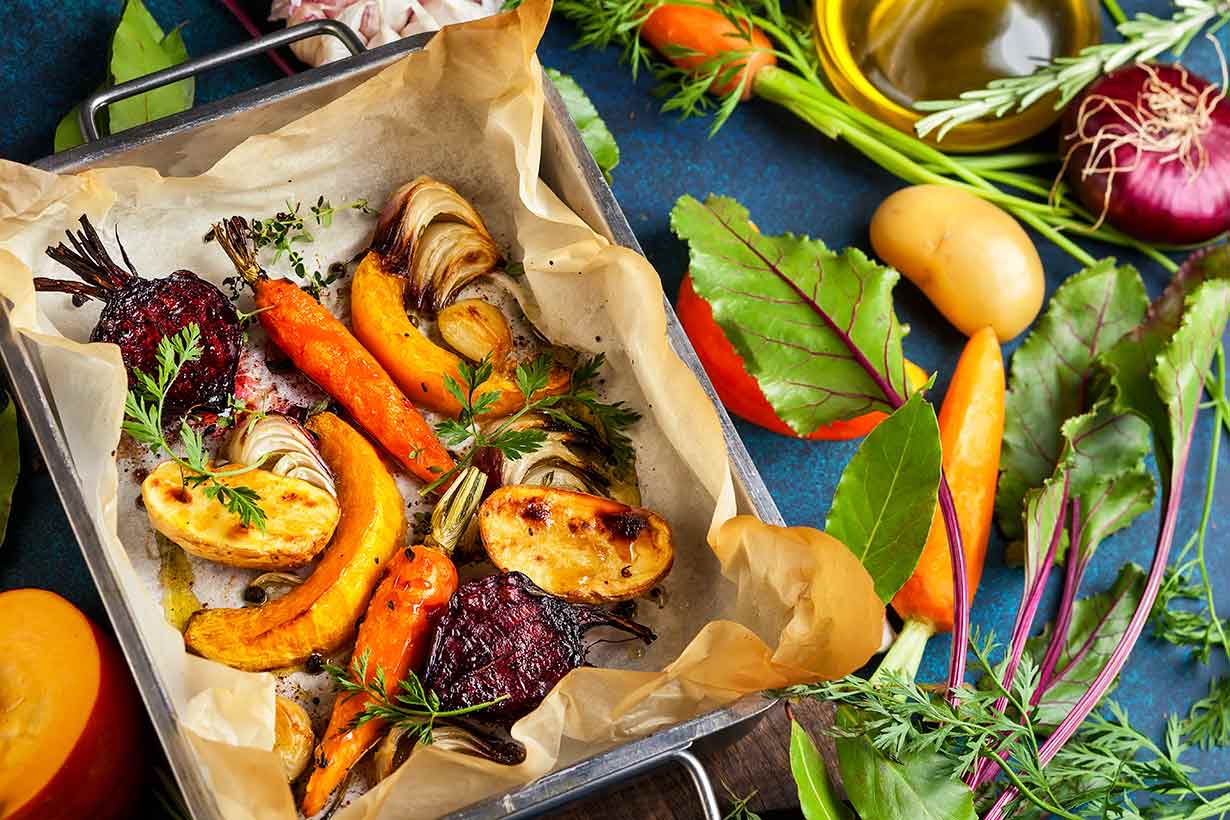Carrot juice enjoys just a fraction of the popularity that various fruit juices have.
Despite this, this popular vegetable juice offers higher levels of nutrients for less sugar.
So, on that note, is carrot juice good for you?
The answer, as always, is that it depends on context. This article looks at the nutritional values of carrot juice and the available scientific research on it.
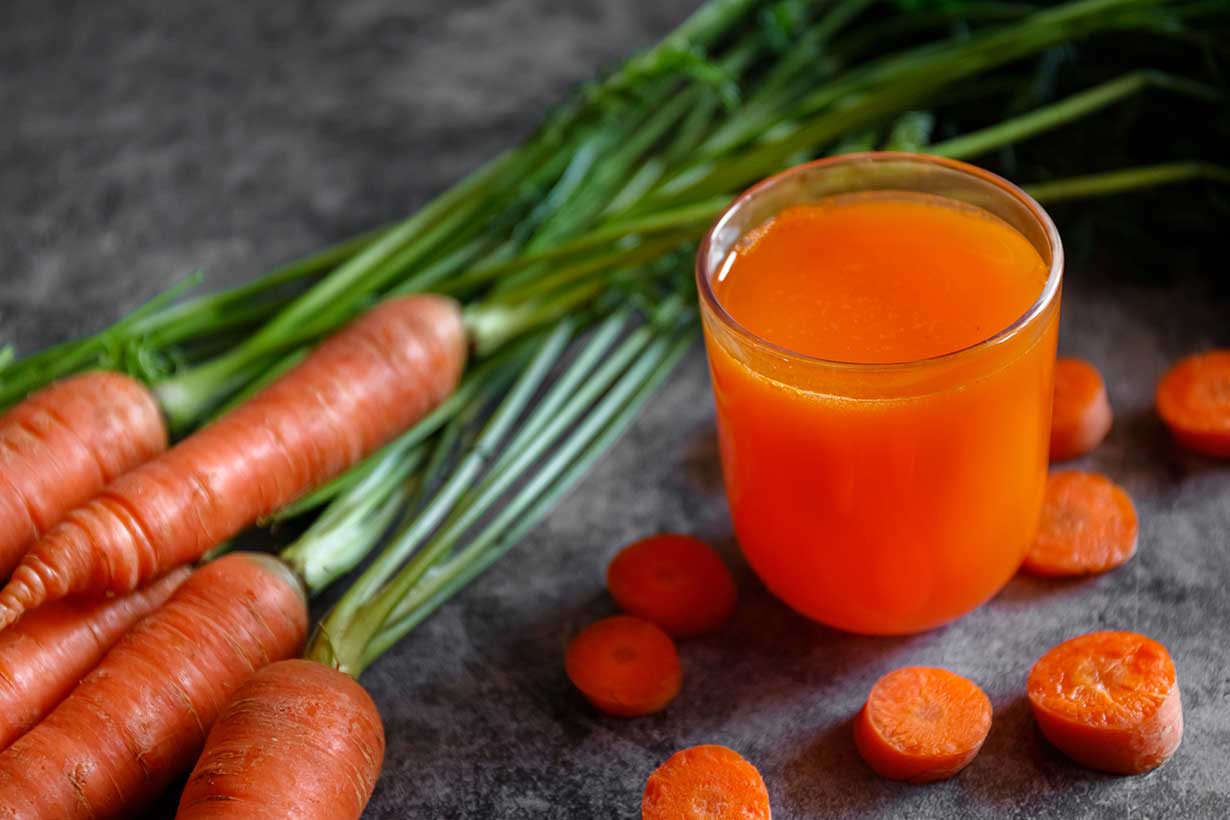
Carrot Juice Offers An Excellent Range of Vitamins and Minerals
First of all, carrot juice offers more nutritional value than typical fruit juices like orange juice.
One standard serving of carrot juice is equivalent to one cup (or 240 grams).
Using data from the USDA’s FoodData Central database, here are the nutritional values for one serving of 100% carrot juice. All daily values have been calculated using USDA data and the FDA’s published daily values (1, 2):
| Name | Amount | % Daily Value (DV) |
|---|---|---|
| Calories | 96 kcal | 5% DV |
| Carbohydrate | 22.3 g | 8% DV |
| Fiber | 1.92 g | 7% DV |
| Sugars | 9.38 g | |
| Fat | 0.36 g | <1% DV |
| Saturated | 0.06 g | <1% DV |
| Monounsaturated | 0.02 g | |
| Polyunsaturated | 0.17 g | |
| Protein | 2.28 g | 5% DV |
Vitamins
Here is the vitamin content per cup serving of carrot juice (1, 2):
- Vitamin A RAE: 254% DV
- Vitamin B6: 31% DV
- Vitamin K: 31% DV
- Vitamin C: 23% DV
- Thiamin (B1): 18% DV
- Riboflavin (B2): 10% DV
- Niacin (B3): 6% DV
- Choline: 4% DV
- Folate: 2% DV
- Vitamin B12: 0% DV
- Vitamin E: 0% DV
- Vitamin D: 0% DV
Like regular carrots, vitamin A (in the form of carotenoids) is the most concentrated nutrient found in carrot juice.
Minerals
Per cup serving, carrot juice provides the following minerals (1, 2):
- Potassium: 15% DV
- Manganese: 13% DV
- Copper: 12% DV
- Magnesium: 8% DV
- Phosphorus: 8% DV
- Sodium: 7% DV
- Iron: 6% DV
- Calcium: 4% DV
- Zinc: 4% DV
- Selenium: 3% DV
Large Amounts of Carotenoids
Carrot juice provides a large number of carotenoids per cup serving, and these carotenoids include (1):
- Alpha-carotene: 10400 mcg
- Beta-carotene: 22300 mcg
- Lutein and zeaxanthin: 799 mcg
- Lycopene: 4.8 mcg
The first two of these carotenoids—alpha-carotene and beta-carotene—convert to vitamin A (retinol) within the body. For this reason, they are sometimes known as provitamin A carotenoids (3).
Since carrot juice provides a large number of carotenoids, it also offers a significant amount of vitamin A. As shown in the ‘vitamins’ section, just one cup of carrot juice supplies 2290 mcg of vitamin A retinol activity equivalents (1).
This is equal to 254% of the recommended daily value (2).
The other carotenoids in carrot juice—lutein, lycopene, and zeaxanthin—are non-provitamin A carotenoids. This means that they do not contribute any vitamin A activity in the body (3).
However, lutein, lycopene, and zeaxanthin may have nutritional benefits of their own, particularly concerning their antioxidant function and role in eye health. That said, existing findings from human studies in this area have been mixed, and larger clinical trials are necessary to confirm potential benefits (4).
Contains Less Sugar Than Orange Juice and Other Fruit Juices
Carrot juice tends to be more nutrient-rich than orange juice and other fruit juices. We can see this by comparing the vitamin and mineral content of carrot juice and orange juice (1, 5).
At the same time, it also provides the double bonus of containing lower amounts of sugar.
Although naturally occurring sugars in fruit or vegetable juices are not classed as ‘added sugar,’ they are known as free sugars. Free sugars are no longer enclosed within the cell walls of whole food and thus have a larger glycemic impact than whole foods.
On this note, the World Health Organization has strongly recommended that children and adults reduce their intake of free sugars to less than 10% of total daily energy intake (6, 7).
The table below shows how the sugar content of carrot juice compares to other popular juice drinks per cup serving (1, 5, 8, 9):
| Juice Name | Amount of Sugar Per Cup |
|---|---|
| Carrot Juice | 9.4 grams |
| Apple Juice | 23.9 grams |
| Orange Juice | 20.8 grams |
| Pineapple Juice | 24.8 grams |
What is the Glycemic Index of Carrot Juice?
Carrot juice has a fairly low glycemic index and glycemic load compared to other fruit juices.
According to the University of Sydney’s Glycemic Index tool, carrot juice has a glycemic index of 43. Based on a 250-gram serving, it has a glycemic load of only 10 (10).
Potentially Protective Against Smoking-Induced Damage
There has been a long line of research looking into the effects of supplemental beta-carotene in smokers.
In this regard, chronic high doses of supplemental beta-carotene have been shown to potentially promote lung cancer in smokers. It has been theorized that this may be due to beta-carotene’s susceptibility to oxidize and act as a pro-oxidant in smokers’ lungs (10, 11).
However, this specifically relates to high doses of supplementary beta-carotene, so is there any research on carrot juice? The answer to this question is yes, but the existing research is limited.
In a small randomized controlled trial, 48 smokers were supplemented daily for eight weeks with either (12):
- 300 ml carrot juice
- A supplement containing the same amount of beta-carotene and vitamin C as the juice
- A placebo
After eight weeks, markers of DNA damage in the carrot juice and beta-carotene groups were both significantly lower than the placebo group.
Thus, this study suggests that foods containing beta-carotene and vitamin C, such as carrot juice, may help to reduce levels of oxidative damage in smokers.
However, this was just one small study. Larger and better-powered clinical trials are necessary before we can make strong inferences.
May Lower Oxidative Stress
Since carrot juice is a concentrated source of nutrients with an antioxidant function, several studies have looked at carrot juice’s potential for lowering oxidative stress.
Oxidative stress refers to an imbalance between the formation of damaging reactive oxygen species in the body and the body’s ability to neutralize or repair such damage (13).
When this imbalance exists, chronic and long-term oxidative stress has been linked to the development of various chronic diseases (14, 15).
There have been some small human trials on the effects of carrot juice in this area:
- In a small trial involving seventeen adults, participants drank 16 fl oz (473 ml) of carrot juice per day for 90 days. After three months, blood tests showed that blood antioxidant status had increased and the participants had decreased levels of lipid (cholesterol) peroxidation (16).
- Another randomized trial involving twenty-two healthy men examined the effect of 330 ml of carrot juice per day for two weeks. Although antioxidant status slightly increased, there was no significant effect on lipid peroxidation (17).
- A carrot juice intervention in sixty-nine overweight breast cancer survivors involved the participants consuming 8 ounces (237 ml) of carrot juice per day for three weeks. After three weeks, all participants had a rise in plasma carotenoids and lower levels of 8-iso-PGFa. 8-iso-PGFa is a reliable biomarker of oxidative stress (18).
Although they present mixed findings, these studies indicate that carrot juice intake may potentially decrease oxidative stress.
However, it is worth noting that many different foods (such as berries) may exhibit such effects. In other words, this should not be viewed as some unique reason to consume carrot juice.
How Does Carrot Juice Taste?
When you first taste carrot juice, the flavor can be somewhat surprising.
Although it contains less sugar than most other juices, the taste is still incredibly sweet, and it has a strong flavor. The taste is perhaps best described as “concentrated carrot.”
For those that love carrots, the juice will probably be enjoyable.
It may be best to avoid the juice for those who don’t enjoy the flavor of whole carrots.
Homemade Carrot Juice Is Easy To Make
Although carrot juice on store shelves can be expensive, it is relatively easy (and much more affordable) to make at home.
Making carrot juice just involves adding a few carrots into a juicer and hitting the start button.
It is also possible to make carrot juice in a blender or food processor. Depending on the power of the appliance, this may require adding a small amount of water.
For those who find the concentrated carrot taste too strong, it is simple to dilute the strength by adding more water.
Final Thoughts
The answer to the question “is carrot juice good for you?” very much depends on the context.
Generally speaking, whole foods are a better choice than fruit or vegetable juices. This is because they contain all the fiber, have a lower glycemic impact, and are better for satiety.
However, among the various juice options, carrot juice is one of the best nutritionally.
Carrot juice provides large amounts of vitamins and minerals for relatively few grams of sugar (and calories). The drink is also a rich source of carotenoids, which may have further potential benefits.
For those who enjoy the taste, carrot juice is a convenient way of getting some extra nutrients.

